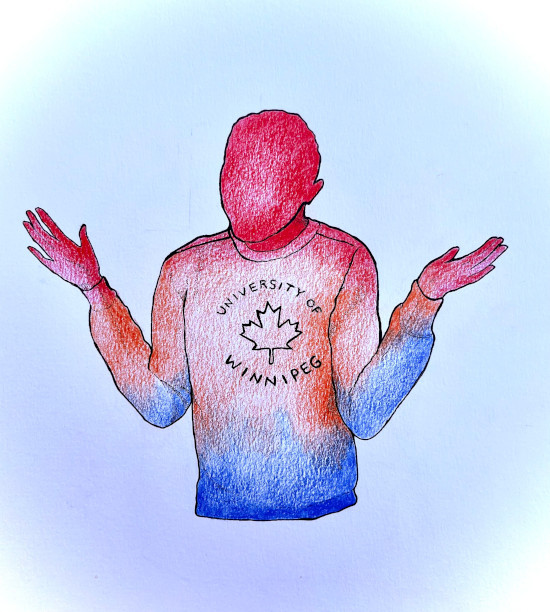University culture in flux
Why come to the U of W?

As a smaller institution, fostering an internal culture is integral to attracting students to the University of Winnipeg (U of W). When I weighed my options, my perception of the university’s culture brought me in.
When entering my final year of high school, I was presented with the same question as many other university-bound students in Manitoba: the U of W or the University of Manitoba (U of M)?
On the one hand, the U of M represents a traditional university offering options at all levels of study, from undergraduate to doctoral. It boasts big class sizes, a large campus and a robust series of on-campus amenities.
Conversely, the U of W is primarily an undergraduate institution with few graduate programs. The school has compact class sizes and a smaller campus nestled in the city’s downtown.
What drew me to the school was the U of W’s culture as a liberal-arts university with progressive values and an active student body. University of Winnipeg Students’ Association (UWSA) initiatives, such as the Indigenous course requirement and divestment, emphasized that the U of W was the school for those seeking a critical and engaged education.
When I started classes, the school lived up to my expectations. Student organizing seemed like it was everywhere when you walked through Centennial Hall. Small class sizes meant professors were often willing to engage with students. The campus’ location granted students access to a thriving downtown.
The U of W has experienced a series of shake-ups in recent years. A UWSA executive resigned after allegations of racism. A recent talk at the U of W sparked outrage from many due to its transphobic themes, and the U of W administration experienced several departures of senior staffers, many of whom were women.
In a CBC article referencing the controversial talk and its transphobic themes, one student expressed, “The university is a historical place of student activism and human rights, so it seems very bizarre to me why they would promote this talk that is specifically singling out trans people.”
The repeated controversies seem to imply that the U of W is struggling with its position as a progressive institution. In light of these recent events at the university, my first reaction was to declare that the experience at the U of W is changing for the worse.
There is still a strong student and faculty component who remain dedicated to an activist approach. The UWSA quickly reacted to last year’s transphobic talk controversy by organizing an on-campus protest, and students often hold rallies for Indigenous and 2SLGBTQIA+ rights. But the U of W’s administration seems to want the school to change.
Maclean’s rates the U of W as the 12th of 19 primarily undergraduate universities. The repeated blunders might be a part of failed attempts to shake things up or generate more attention.
I do not know what these changes do for the U of W’s reputation among university rankings, but they do hurt the U of W’s reputation as a progressive institution.
As an undergraduate university, carving out an identity for the U of W is vital for attracting new students. But the question is, who defines this identity? Is it the administration, the students’ association, the professors or the student body?
Patrick Harney is the comments editor at The Uniter. He is a graduate student at the University of Winnipeg.
Published in Volume 78, Number 01 of The Uniter (September 7, 2023)







